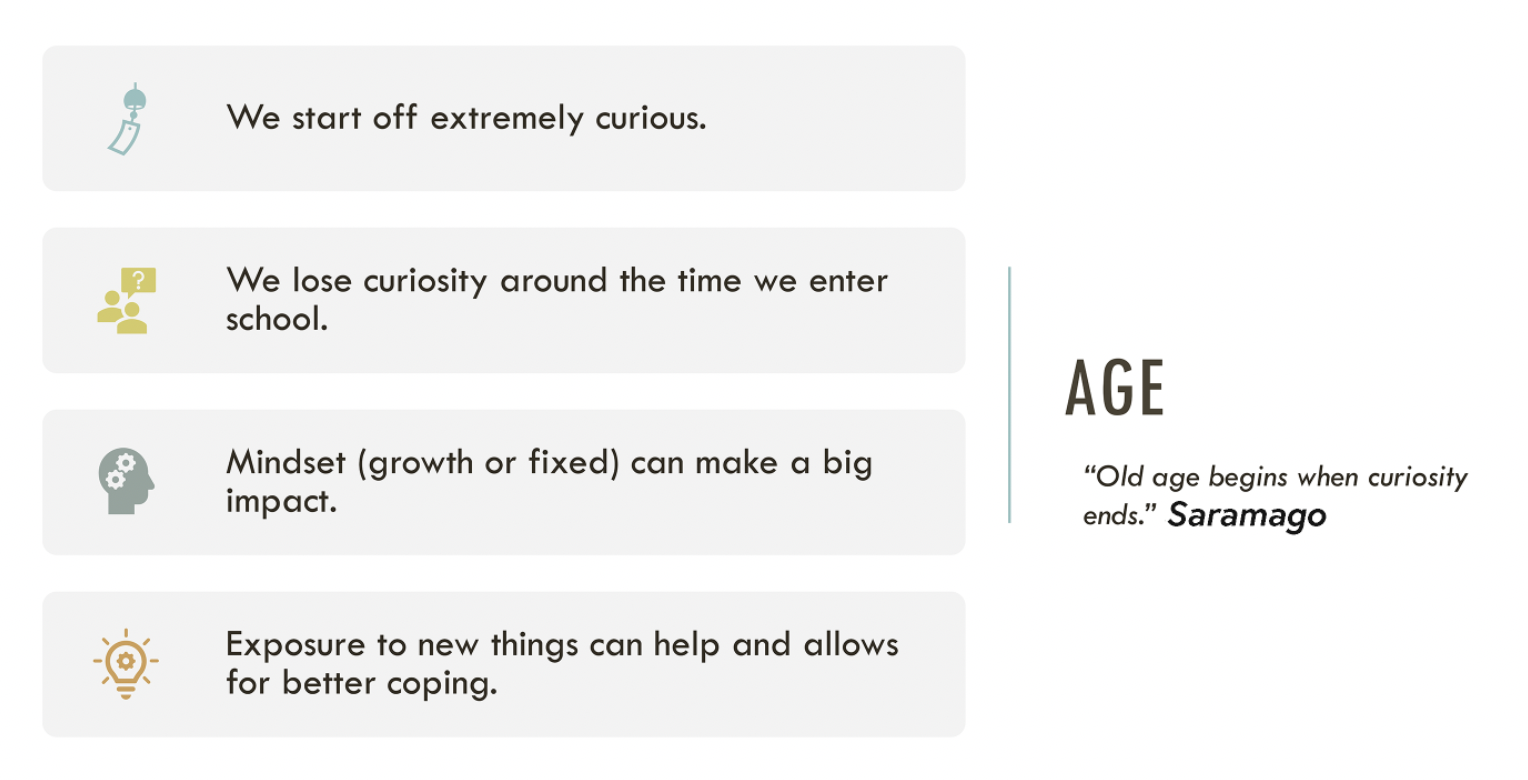Does our curiosity change as we age?
Does our curiosity change as we age? Does it decrease? Do we lose our childlike curiosity as we grow?
Do Millennials tend to have more curiosity than Baby Boomers, or less? Is age a factor in determining our curiosity to learn new things or to pursue new ideas? Just curious!
According to Robert Stokoe, director of the Jumeirah English-Speaking Schools in Dubai, United Arab Emirates [1]
‘‘Three-year-olds, on average, ask their parents about 100 questions a day, every day! However, by the time they are ten to 11 years of age they’ve pretty much stopped asking. Of even greater concern is that by the age of 25, only two percent can think outside the box. Curiosity seldom survives childhood. Adult creativity is still powerful, but there is just not enough of it. It can be said that the creative adult is the curious child who survived.’’
Every mind is born with the instinct of curiosity. We all come into the world curious, an innate gift which newborns demonstrate as soon as they are born when they begin to look around. Robert Stokoe [1]
Then there is the dreaded 8-10 year slump.
The results from this game were both predictable and surprising.
“The speed with which the volunteers made decisions and shifted between tasks definitely declined with the older participants, with the first signs of cognitive decline beginning around the ripe old age of 24.”
Safety
“The safety and security an individual feels about their surroundings is clearly a factor regarding curiosity more than a person’s age. But consider that Millennials grew up in a time with very low trust, due to the Financial Crisis, the events of 9/11, parents losing their jobs, etc. So, because they have low trust, they’re apt to question things at a higher rate than a Gen Xer or baby boomer would at their age. Earlier generations grew up in a very ‘safe’ era and typically trusted leadership, so there wasn’t the questioning and curiosity in the same way there is now.”
Quality of life
Curiosity and coping
“Those with higher levels of curiosity showed better coping skills with new challenges or new experiences. They were also more adept at establishing new friendships and showing new ways to solve problems. The adaptive value of exploratory, problem-solving behavior is fundamental to living longer.”
“When we are children, our curiosity leads to effective intellectual and emotional development. When this child-like trait continues, it enhances our ability to live longer with more active lives.”
Discussion
What happens to creativity and curiosity as we age? We will find out more in Week 2 of this course!What other features and attributes change as we age? And how would you tackle maintaining your curiosity as you age?
References
1. Stokoe R. Curiosity, a Condition for Learning. Questia.com. 2012 [cited 27 August 2020]. Available from: https://www.questia.com/library/journal/1P3-3009007551/curiosity-a-condition-for-learning
2. Bowlby J. Attachment, communication, and the therapeutic process. A secure base: Parent-child attachment and healthy human development. New York: Basic Books; 1988.
3. Dweck C. Mindset: The New Psychology of Success. New York: Penguin Random House; 2006.
4. A quote by Eleanor Roosevelt [Internet]. Goodreads.com. [cited 27 August 2020]. Available from: https://www.goodreads.com/quotes/395328-i-could-never-be-content-to-take-my-place-by
5. Hamilton PhD D. Cracking the curiosity code: The key to unlocking human potential. Gatekeeper press. Columbus, Ohio: Dr. Diane Hamilton; 2018.
Share this
Innovative Leadership: Developing Curiosity

Innovative Leadership: Developing Curiosity


Reach your personal and professional goals
Unlock access to hundreds of expert online courses and degrees from top universities and educators to gain accredited qualifications and professional CV-building certificates.
Join over 18 million learners to launch, switch or build upon your career, all at your own pace, across a wide range of topic areas.
Register to receive updates
-
Create an account to receive our newsletter, course recommendations and promotions.
Register for free








